-
About
- About Listly
- Community & Support
- Howto
- Chrome Extension
- Bookmarklet
- WordPress Plugin
- Listly Premium
- Privacy
- Terms
- DMCA Copyright
- © 2010-2025 Boomy Labs

 Sodimate Inc
Sodimate Inc
Listly by Sodimate Inc
Industrial manufacturing related blogs to bulk handling, powder conveying, transferring, slurry etc. Perfect for manufacturers and everyone.

A bulk storage silo is a large structure used to store bulk material. Choose different types of bulk storage silos based on your needs and the nature of the bulk material. Read to find out everything about bulk storage silos.
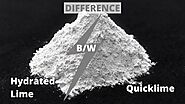
Hydrated lime and quicklime are both calcium compounds. The main differences between hydrated lime and quicklime are their reactivity & their chemical composition. Their process feed rate determines the choice of using hydrated or quicklime. Get to know more about the differences between hydrated lime and quicklime here.
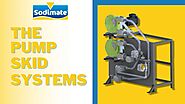
Pump skids consist of a pump and a driver mounted on a steel base. It handles applications like fire suppression, chemical dispensing, water pumping, and metering processes. Know more about pump skid systems read this guide.

Flue gas treatment is the process of reducing the amount of emitted pollutants when fossil fuels are burnt at any industrial facility or place. These pollutants, if released freely, can affect the quality of our environment. Know everything about how flue gas treatment helps in cleaning the environment and its process in this article.

Screw feeders have different features and specifications, and they can be made from various materials depending on the nature of the product. Learn more about properties to select the right screw feeder for your industry to get better efficiency.
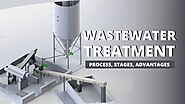
Wastewater treatment is the process of converting wastewater or used water that can be released back into the environment safely. Though, recent studies have shown a decrease in production or recycling waste within the production process. But, many industries remain dependent on processes that produce wastewaters. Let's know more about wastewater treatment and its process here.

The process of turning river water into drinking water is drinking water treatment. How to treat drinking water and remove pollutants, pesticides, organic molecules from raw water read this article.
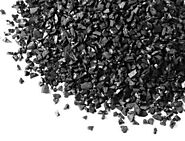
Activated carbon comes in many different forms, each with its own unique set of benefits that make it better suited for certain applications than others. Read on to learn about some of the most common types of activated carbon.

Hydrated lime and quicklime are both forms of lime, a white alkaline substance that is produced by heating limestone or calcium carbonate. They are commonly used in various industrial and agricultural applications. Continue reading to learn about the differences between quicklime and hydrated lime.

Sludge stabilization is a process used in wastewater treatment to treat the sludge that is produced, intending to convert it into a more stable and less odorous material. The ultimate goal is to reduce the potential health and environmental risks associated with the disposal or reuse of wastewater sludge. Continue reading to discover the importance of sludge stabilization.
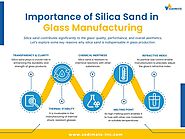
Silica sand contributes significantly to the glass' quality, performance, and overall aesthetics, making it indispensable in glass production. Here are some benefits of silica sand in glass manufacturing.

Potassium chloride (KCl) and sodium chloride (NaCl) have various uses in several industries. Potassium chloride acts as a salt substitute in the food industry, while sodium chloride is employed in water treatment and soap making. Read on to learn the differences between potassium chloride and sodium chloride before making a choice.
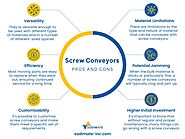
Screw conveyors are versatile mechanical devices used in various industries to transport bulk materials from one location to another. Screw conveyors offer several advantages, but like any other piece of equipment, they also have their drawbacks. Here are some pros and cons of screw conveyors to help you understand their benefits and limitations.
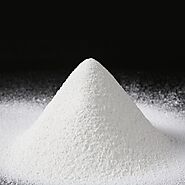
Quicklime also known as calcium oxide (CaO), is a widely used chemical compound with various applications across different industries. It is derived from limestone through a process called calcination, which involves heating limestone at high temperatures until it undergoes a chemical transformation. Read on to learn more about quicklime.
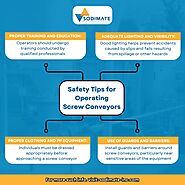
Screw Conveyors are an important part of many industries as it provides efficiency in moving bulk material. Screw Conveyors have many moving parts, and if not operated or maintained properly, it may lead to potential hazards. Here are some tips for the safe operation and maintenance of screw conveyors.
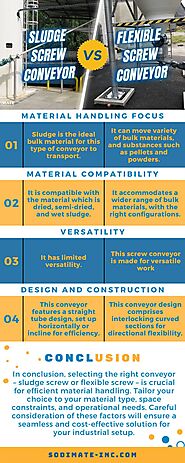
Sludge and flexible screw conveyors stand out as prevalent picks for efficiently transporting materials in industries. Both conveyors fulfill specific roles and offer unique advantages. Dive deeper to explore the differences between sludge and flexible screw conveyors and determine which one is best for you.

Ensuring precise pH levels throughout every phase of wastewater treatment is essential to meet stringent water quality standards. Delve into the pivotal role of pH regulation within wastewater treatment plants, and uncover the vital significance of alkalinity adjustment in wastewater treatment plants.

Discover the difference between volumetric and gravimetric feeders and learn why gravimetric, particularly loss-in-weight feeders, reign supreme. From material characteristics to batching needs, we delve into the key considerations for optimal feeder selection. Dive into our blog now for expert insights and actionable tips.

For over 40 years, Sodimate has been engineering and manufacturing for industries and municipalities with more than 9,000 systems that store, discharge and convey bul...